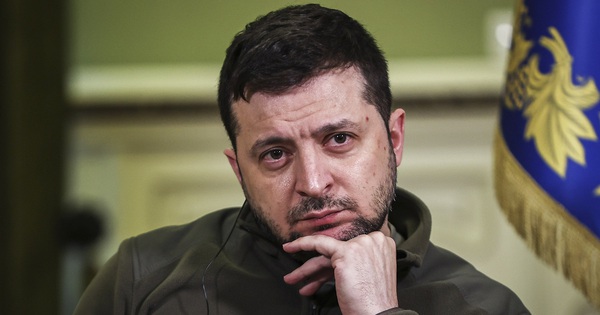A rift appeared in the heart of the West
After a visit to Kiev and a meeting with Ukrainian President Volodymyr Zelensky, Speaker of the US House of Representatives Nancy Pelosi affirmed that the US will “stand with Ukraine until victory”. US Defense Secretary Lloyd Austin said that “we want to see” Russia weakened to the point of not being able to do anything like it did with Ukraine.”

Members of Russia-backed forces drive tanks into the Donetsk region on May 22. Photo: Reuters
Washington has spent an unprecedented amount of assistance, $54 billion, on Kiev since the war in Ukraine began. Much of that budget was approved last week when President Biden signed a bill providing an additional $40 billion for Ukraine, including $20 billion in military assistance.
However, behind Washington’s confident statements, the US does not seem to have a specific strategy or plan for ending the war in Ukraine on terms that Kiev can accept.
The Financial Times cited draft points in an internal document of the US National Security Council as saying that Washington wants to work towards a “democratic, independent and sovereign Ukraine”, as well as ensure that the efforts of Russia’s attempt to dominate Ukraine will fail.
“Our focus is on supporting Ukraine as much as possible on the battlefield to ensure that it has as much influence as possible at the negotiating table,” the draft discussion points read.
Some analysts say the Biden administration will probably continue to take a “strategic dubious” approach to the war in Ukraine.
“The goal of this strategy is to make sure Russia fails, but it won’t specify and exactly what that failure is. This is supposed to be to maintain flexibility. They don’t want to get too caught up in internal politics. details of that,” said Steven Pifer, former US Ambassador to Ukraine and William Perry scholar at Stanford University.
The Biden administration is currently trying to maintain a strategic balance. The United States wants to provide effective military support to Ukraine but also wants to avoid any impression that Washington is forcing Kiev to make final territorial concessions.
At the same time, the United States is also trying to rally an international coalition to support Ukraine, including European allies who have openly expressed concern about the impact of a protracted war on Ukraine as well as on Ukraine. their own society and economy.
Some Ukrainian officials and Eastern European leaders argue that the war will only end when the entire Ukrainian territory is “liberated”. However, some Western countries encourage compromise so that the two sides can come to the negotiating table, just as Ukraine may make territorial concessions to Russia as part of a peace deal.
While all members of the US international coalition agree that the final decision rests with Ukraine, they understand that Kiev’s ability to fight this war depends mainly on weapons and financial support that it cannot afford. Ukraine receives – most of which comes from the US.
US divided over heavy weapons support for Ukraine
The recent substantial US support for Ukraine demonstrates Washington’s enduring commitment to Kiev, but it is also being defined very cautiously.
The United States has supplied Ukraine with billions of dollars worth of heavy weapons, and officials in the Biden administration say they are discussing additional Ukraine requirements as they prepare to plan their distribution. publish this latest support package.
Washington has committed to supply dozens of US-made 155 mm howitzers to Ukraine. This weapon has a longer range and is more accurate than standard Russian artillery. Most of the weapons have already arrived in Ukraine and are beginning to be used on the battlefield, US defense officials said.
The Biden administration is facing political pressure to go further in supporting Ukraine. Rob Portman, Republican Senator from Ohio and several other senators called on President Biden to ship more missile systems to Ukraine.
“We need to make sure we’re giving them what they really need. We shouldn’t be fooling ourselves that if we stop providing systems like the Multiple Launch Missile System (MLRS) for Ukraine, we will not provoke Russia and President Putin will stop or reduce the attacks,” said Rob Portman.
Ukrainian officials have repeatedly requested longer-range weapons such as the High Mobility Artillery Rocket System (HIMARS). However, the US has yet to make a decision on providing the system, while one congressman said the Biden administration is still hesitant to transfer them to Ukraine.
The Biden administration does not want US military weapons supporting Ukraine to be used to attack Russian territory, and it will not provide information about senior Russian military leaders. on the battlefield, US officials said.
US officials say Russia will be weaker after the war, whatever the outcome, because Moscow faces international sanctions and export controls that have weakened its economy.
Russia will be weakened regardless of the outcome of the war and be surrounded by more NATO countries, said Samuel Charap, senior political scientist at the Rand Corporation, referring to Finland and Switzerland. Dictionary decided to join NATO.
However, US officials say Russia still has a significant advantage over Ukraine and that a protracted war could push Ukraine into financial crisis. The blockade of ports in the Black Sea forced Ukraine to stop exporting wheat. This would also be a major blow to the world food supply.
Europe does not have the same language
So far, some cracks have begun to appear that show the war in Ukraine is dividing Europe as countries like Poland and Britain maintain a hardline stance while France, Italy and Germany take steps. more cautious.
Supporters of the first view argue that any concessions to Russia will only make the fighting worse. Latvian Prime Minister Krisjanis Karins declared this week that “the only solution to this war is for Ukraine to win and Russia to be defeated”. Polish President Andrzej Duda also objected to “concern positions” that Ukraine should respond to Russia’s demands.
Meanwhile, the French President and Italian Prime Minister said that the sides should quickly negotiate an end to the war and expressed concern about a protracted war.
French President Emmanuel Macron said that Western countries “never try to humiliate or have a mindset of revenge” when dealing with Russia. However, the French leader also affirmed that the decision on “negotiation conditions with Moscow” was up to Kiev.
President Macron also emphasized the need for a ceasefire in the context of Ukraine pressing Western countries to provide more heavy weapons.
Italian Prime Minister Mario Draghi told President Biden during a meeting in May that Italy wants a ceasefire in Ukraine to be implemented to prevent loss of life and to resume negotiations to resolve issues between the two countries. Russia and Ukraine.
The most acute tension between the parties today is over how a territorial settlement could end the war. Ukrainian officials want to retake Donbass and even Crimea in a counterattack if the West provides enough weapons.
Some politicians in Ukraine expressed anger when former US Secretary of State Henry Kissinger suggested that Kiev should make territorial concessions to end the losses of a protracted war. “Ideally, the dividing line should return to the status quo. Pursuing war beyond that point would not be for Ukraine’s freedom but to launch a new war against Russia.”

Ukrainian President Zelensky. Photo: Reuters
However, in an interview with Ukrainian television last week, President Zelensky said that Kiev accepts the pre-war status.
“I would consider it a victory for our country. We have not yet regained all of our territory because things are not so simple. We have to weigh the cost of war and the cost of war. each time the occupation ceases”.
Washington’s position appears to be straddling the two extremes of its European allies, because while US officials are not pressing Ukraine to return to peace talks immediately, they are more cautious about moves. can cause tension to escalate.
European countries are now worried that the food crisis caused by the closure of Ukrainian ports, making it impossible for wheat to be exported, will affect African and Middle Eastern countries, leading to a new wave of migration to Europe.
“No European country wants a never-ending war. This war costs Russia but also increases instability in its neighbours. Europe wants a peace deal that will take place with those who want to make peace. conditions are acceptable,” said Stefano Stefanini, former Italian ambassador to NATO.
at Blogtuan.info – Source: Soha.vn – Read the original article here



